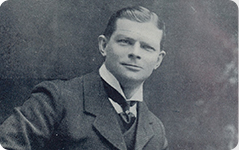Charles Urban: Pioneering the Non-fiction Film
Published: 5 November 2013 25 November 2013
25 November 2013
18.45-20.15
Conference Centre, British Library
Price: £4 / £3 concessions
Book ticketes here
Charles Urban is one of the most important figures in early British and America cinema. Widely celebrated in his day, he has remained a name in film history chiefly for his development of Kinemacolor, the world’s first successful natural colour moving picture system. He was also a pioneer in the filming of war, science, travel, actuality and news, a fervent advocate of the value of film as an educative force, and a controversial but important innovator of film propaganda in wartime when he worked on behalf of the British government to place official war films on American screens during the First World War.
In this talk Luke McKernan, author of Charles Urban: Pioneering the Non-Fiction in Britain and America, 1897-1925 (University of Exeter Press, 2013), will use Urban’s story to show how the non-fiction film developed in the first years of the twentieth century, and the dilemmas that it faced within a cinema culture in which the entertainment fiction film was dominant. Urban’s solutions – some successful, some less so – illustrate the groundwork that led to the development of documentary film. The talk will be illustrated by examples of Urban’s film productions, including some rare Kinemacolor films from the 1910s, with a live piano accompaniment by Neil Brand.
Luke McKernan is Lead Curator, News and Moving Image at the British Library
This event is sponsored by the Eccles Centre for American Studies at the British Library.
 Learning on Screen
Learning on Screen